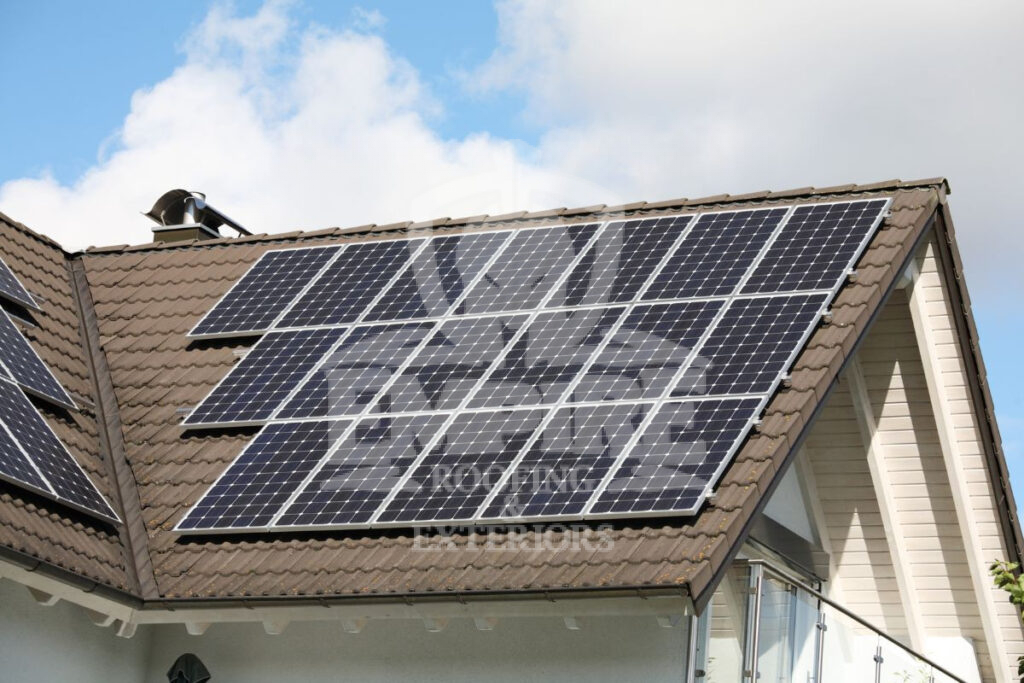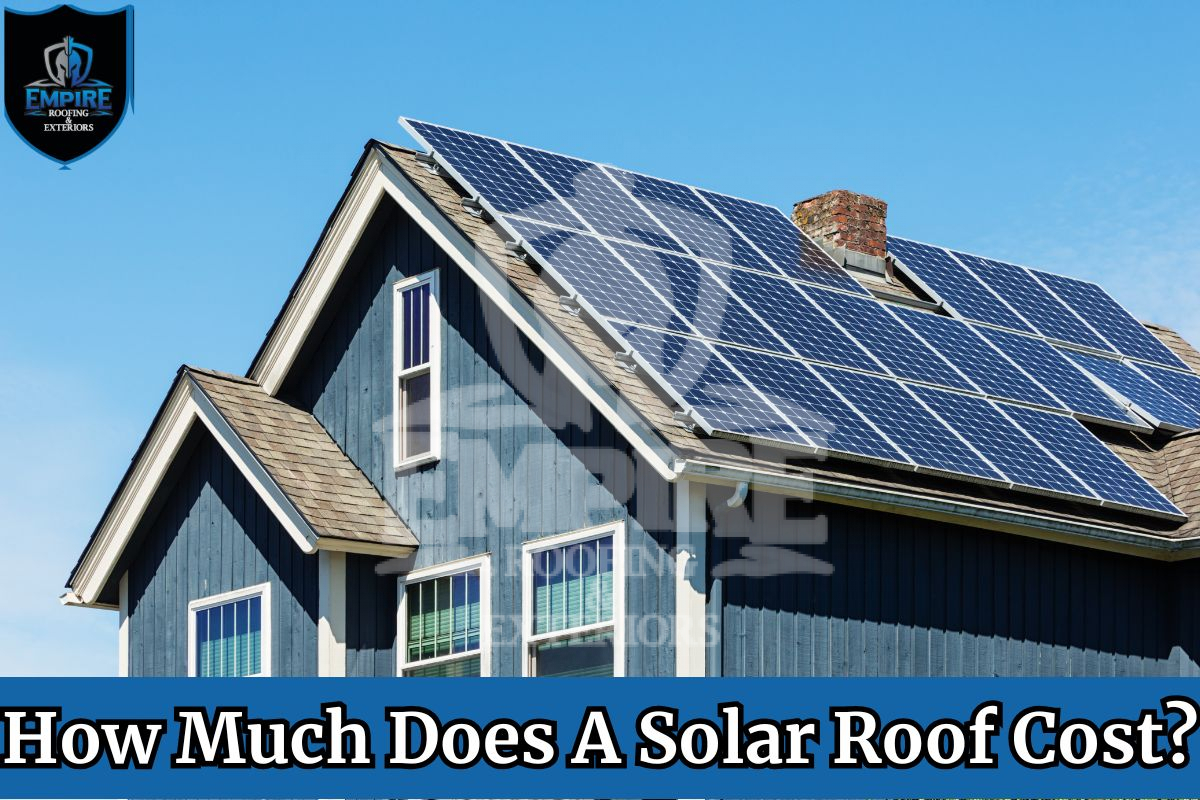When it comes to environmentally friendly home upgrades, solar roofs have become a game-changer in recent years. Solar roofs are becoming a popular choice as homeowners look for ways to lower their energy expenses and carbon footprint. But one question frequently comes up: “How much does a solar roof cost?”
To help you out, this blog post will discuss the long-term benefits and the costs associated with a solar roof.
What is a Solar Roof?
A solar roof is a roofing system that combines photovoltaic (PV) technology to generate electricity from sunlight with traditional roofing materials to protect the roof. It can feature either traditional solar panels or solar shingles that blend with regular roofing materials.
Many homeowners choose solar roofs because they offer both energy savings and a sustainable option. Plus, solar roofs can lower electricity bills, and any extra energy can be sold back to the grid, making them a smart investment for those looking for an eco-friendly roofing solution.
Average Cost Estimates For a Solar Roof

Depending on the location and size of the system, the cost to install a solar roof differs across the U.S. An 11-kW home solar installation will typically cost around $21,000 after federal tax credits, with an average cost per watt before incentives of $2.75. Larger homes may incur greater total costs, but over time, solar installations become more reasonable thanks to a number of incentives that lessen the financial strain.
Cost of Solar Panels by Type
There isn’t a single solar panel roof cost, as different types come with varying prices. Some options include:
1. Polycrystalline Solar Panels
These panels are created by melting several silicon crystals, resulting in a bluish hue. They are budget-friendly since they cost less to produce, but their efficiency is lower, usually around 13-16%. This means they generate less electricity per square foot compared to monocrystalline options. Average prices range from $0.90 to $1.00 per watt.
2. Thin-Film Solar Panels
Thin-film solar panels consist of a thin layer of solar material applied to surfaces like glass or plastic. Their lightweight and flexible design makes them perfect for various uses, including building integration and portable devices. However, with only 10-12% efficiency, they require more space to produce the same electricity as crystalline panels. These typically cost between $0.50 and $1.50 per watt.
3. Monocrystalline Solar Panels
With each cell made from a piece of a single silicon crystal, these panels provide higher efficiency and better low-light performance. Known for their sleek black appearance, they achieve efficiencies of over 20%, making them the most effective choice. Due to advanced manufacturing, they are more expensive, averaging around $1.00 to $1.50 per watt.
Cost Breakdown
When planning to install a solar roof, various costs need to be considered. Below is a detailed breakdown of the expenses involved:
#1. Initial Purchase and Installation Costs
A. Solar Panels
A significant portion of the total cost comes from the solar panels themselves, averaging $2.50 to $3.15 per watt for residential systems. For a standard 6 kW system, this translates to $15,000 to $22,000 before any tax credits or incentives. Prices can vary depending on the type of panels chosen, with higher-efficiency models typically costing more.
B. Installation Fees
Installation typically adds around $0.50 to $1 per watt to the total project cost. These fees depend on local labor rates and the complexity of the installation.
C. Permitting and Inspection Fees
Local permits and inspections, required to ensure compliance with building codes and safety standards, can range from $500 to $2,000.
D. Roof Repairs or Modifications
If roof repairs or modifications are necessary before installation, costs can add $1,000 to $5,000 to the overall budget. A strong, durable roof is essential for the longevity and efficiency of solar panels.
#2. Additional Equipment Costs
A. Inverters and Batteries
Inverters, which convert solar energy into usable electricity, cost between $1,000 and $3,000. Adding battery storage can increase costs significantly, with prices ranging from $5,000 to $15,000, depending on the system’s capacity and brand.
#3. Long-Term Costs
A. Maintenance and Cleaning
Solar systems typically require minimal maintenance, but occasional cleaning and inspections may cost between $100 and $300 annually. Over 20 to 30 years, this could add up to several thousand dollars, though solar systems tend to be more cost-effective than traditional energy sources.
B. Insurance Adjustments
The added value of a solar system may increase homeowners’ insurance premiums by a few hundred dollars per year, depending on the coverage and provider.
#4. Financing Options
A. Cash Purchase
Paying in full upfront can eliminate interest costs, but it requires a significant outlay—anywhere from $10,000 to $30,000 or more, depending on the system size. This method allows homeowners to fully benefit from available tax credits without dealing with financing terms.
B. Home Equity Loan or HELOC
Using a home equity loan or line of credit (HELOC) offers a way to finance the purchase by tapping into home equity. Interest on these loans may be tax-deductible when used for solar installations.
C. Power Purchase Agreements (PPAs) or Leases
With a PPA or lease, a third-party developer installs and owns the system, while the homeowner pays for the electricity generated at a lower rate than utility prices. Although this option may require no upfront costs, long-term savings may be lower since the homeowner doesn’t own the system.
#5. Incentives and Tax Credits
Federal Solar Investment Tax Credit (ITC)
The ITC allows homeowners to deduct a percentage of their installation costs from their federal taxes. For instance, a $20,000 system could cost about $14,000 after applying tax credits, making it a highly attractive incentive.
What Are The Different Factors That Affect The Cost Of A Solar Roof?
Once you have decided to go for a solar roof, it is important to understand the different factors affecting its cost, like:
1. Roof Size & Complexity
Like any home improvement project, bigger means pricier. A larger roof demands more materials and labor. Plus, if your roof is a complex architectural feat with multiple angles or obstructions, installation gets trickier and potentially more expensive.
2. Solar Type
The solar market offers a range of choices, from shingles that blend seamlessly into your roof to cutting-edge solar panels. These options come with varying price points, with aesthetics and advanced tech often commanding a premium.
3. Energy Needs
How much power do you want your solar roof to produce? More energy means more solar coverage, translating directly to a higher cost.
4. Location & Climate
Where you live matters. Local labor rates, permit fees, and even the weather can play a role in pricing. Harsh climates might necessitate more durable, and likely more expensive, solar roofing solutions.
5. Installation Costs
The installation itself adds to the final bill. This includes any necessary electrical upgrades or structural reinforcements. Experienced installers may charge a bit more, but they often deliver quality workmanship and stronger warranties, offering peace of mind in the long run.
Discover Affordable Solar Roof Solutions At Empire Roofing & Exteriors
The cost of a solar roof is higher than traditional roofs, but it’s an investment in your future. Energy savings, increased home value, and incentives can make it a smart financial choice. Before deciding, consider your energy needs, local climate, available incentives, and long-term plans. Be sure to research, get multiple quotes from trusted installers, and review contracts and warranties. While the upfront cost is significant, the long-term benefits often make it a worthwhile investment for homeowners and the environment.
Ready to switch to solar and make your home energy-efficient? Empire Roofing & Exteriors offers top-quality solar roofing services. Our team will guide you through design and installation for a smooth, cost-effective transition to clean energy. With premium panels, sleek designs, and strong warranties, we’ll help you save money and reduce your environmental impact. Contact us today at (225) 347-8877 for a free consultation and start your journey toward a greener future.
